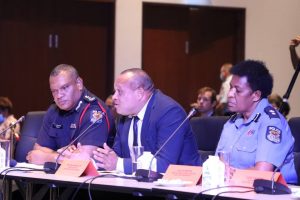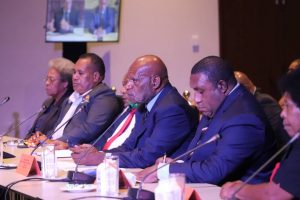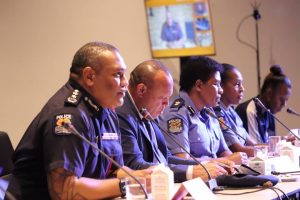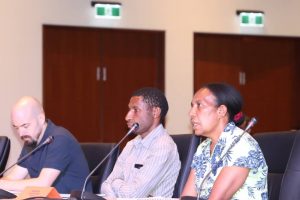The Special Parliamentary Committee on Gender Based Violence (GBV) conducted the first-of-its-kind public hearing on the issue at the APEC Haus. The two-day session, which started yesterday led by Charles Abel, aims to understand the challenges faced by survivors and service providers, identify gaps in the system, and make recommendations to the Parliament on the way forward. One of the priority areas is to investigate the roadblocks behind the funding and implementation of the 2016-2025 National GBV Strategy.
The 7-member Committee summoned various stakeholders including the Minister of Community Development, Youth and Religion and his team, Minister for Police, Royal Papua New Guinea Constabulary, Office of Public Prosecutor, Public Solicitor’s Office NGOs and Churches.
The first day began with the Parliamentary Committee listening to powerful testimonies of survivors, NGOs and human rights defenders on the ground.
Well-known journalist and GBV survivor Hennah Joku gave a glimpse into her struggle to access justice.
“I am here for my daughter and for your daughters. I am here for every woman in Papua New Guinea and for the future of every girl to be born here.”

The Committee also listened to Dr. Fiona Hukula, GBV expert, who spoke of the importance of taking ownership of the problem through a “home-grown initiative, contextualized to Papua New Guinea instead of being dependent on donor agencies”.
The Committee learnt about the challenges faced by those trying to support people suffering from sorcery accusation related violence. Ruth Kissam from the Tribal Foundation articulated, “Any woman who is accused of sorcery are now having their children at risk of the same violence. Cases must be prosecuted to send a message that they cannot be targeted” Her colleague Gary Bustin stated, “What is happening to women and children in Sorcery Related Violence is beyond what one animal would savagely do to another. We need to go after the “glass men”, the witch doctors who are playing on local fears to make money.”
Activists such as Anton Lutz said it is crucial to have minimum standards on expectation of service delivery. “How quickly do the police need to come to a village? What should they do when sorcery related violence is alleged? What services should the survivors be receiving from health service providers and police officers?”

Femili PNG’s Denge Illave passionately listed out the challenges of dealing with high profile perpetrators who bent the law to avoid arrest and intimidate the survivor.
As the morning session wound down, the Committee had established the context and the magnitude of Gender Based Violence in Papua New Guinea, requiring urgent interventions from the National Government, govt agencies, and service providers.
The afternoon session witnessed the Committee members NCD Governor Powes Parkop and Governor Allan Bird grilling the department of community development’s current and former secretaries. On issues of budget and lack of implementation of the GBV strategy, the Committee took a hard stand questioning the lack of progress in establishing a fully functional National Secertariat.
Governor Bird asked the Ministry of Community Development, Youth and Religion, “No one is taking responsibility for this problem. Who is going to take control over gender-based violence? Who is in charge? Does your Ministry have an action plan and can we see it?”

Governor Parkop said, “What excuses can you have? The Strategy was adopted in 2016, yet 6 years later, it has been unsuccessful. Your strategy isn’t working. What has changed now? We need to see concrete plans, budgets by tomorrow.”
Police Minister Hon. William Ongulo spoke to the Committee today about the real challenges of investigating GBV, manpower and resource scarcity. “We have only 150 staff in the Family and Sexual Violence Units across the country – is that enough to really give GBV survivors the support they need and to ensure proper investigations actually take place?”
Police Commissioner David Manning said that he wants to build up a specific GBV specialist stream within the RPNGC which would be responsible for driving the response to GBV.
When asked if the Police could guarantee the safety of women who come to FVSUs, both the Minister and Commissioner gave an honest answer that they don’t have the resources or facilities to guarantee the safety of women.
Day 1 ended with some very constructive suggestions on improvement by various stakeholders, which will be taken into consideration by the Special Parliamentary Committee on GBV.


